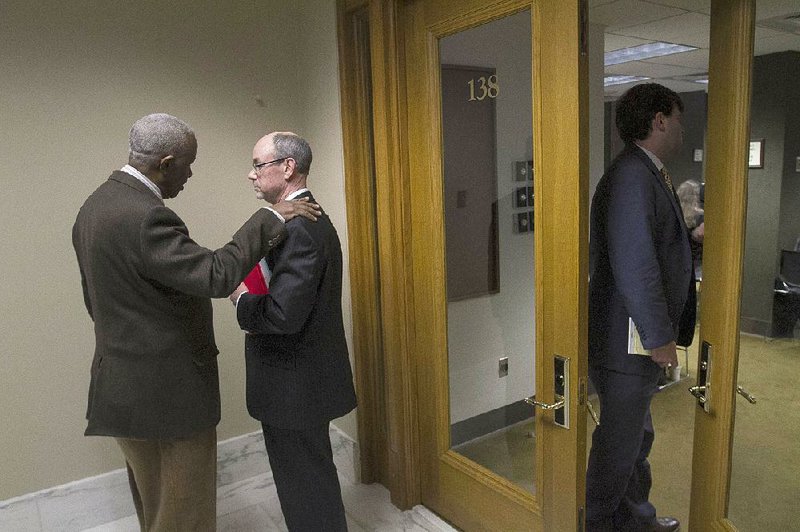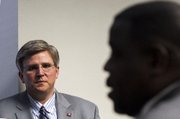The House Education Committee on Tuesday approved a bill to exempt the University of Arkansas System's new online-only university from certain requirements expected of brick-and-mortar colleges.
The committee voted to support the measure, which UA representatives said will allow the system's eVersity program to keep costs low, not take any state general revenue funds and provide more educational opportunities for nontraditional students. Lawmakers shot down a second proposal before the committee Tuesday that would allow students to voluntarily express religious viewpoints in public schools.
The eVersity bill, Senate Bill 265 by Sen. Eddie Cheatham, D-Crossett, exempts UA's eVersity from 15 state laws that campus-based schools have to comply with, including requirements that students be immunized and charging athletic or facility fees. Rep. Nate Bell, R-Mena, said he asked to run the bill through the House because the new program would provide an opportunity for citizens in his district.
"They'll offer workplace-relevant degrees and certificates at affordable tuition rates to meet the needs of adult learners around the state, primarily those who have work and family responsibilities and need an option to finish their education in a way that's flexible enough to meet their needs," Bell said. "Many are well on their way to a degree, but life has gotten in the way of completing it."
Legislators said they were supportive of the eVersity goal to serve Arkansans who are older than traditional college-age students, who might have a family or who work full time. Michael Moore, the system's vice president for academic affairs, said the system will target the 14,000 Arkansans currently attending for-profit online universities.
Moore said the estimated cost would be about $500 per six-week course. Students would enroll in one course at a time to make sure they have the support and time to continue their education, and students could likely take up to seven courses per year, he said.
Reps. John Walker, D-Little Rock, and Charlotte Douglas, R-Alma, both asked about oversight of the online program, including whether the university system would keep track of student demographics, report student progress and offer scholarships.
Moore said the program is not asking to be exempted from submitting demographic information or submitting data on how the program is working.
He said traditional methods of tracking success like how long it takes a student to graduate are less applicable to the new program because it doesn't measure traditional students or traditional success.
The committee moved the legislation to the House on a unanimous voice vote.
House Bill 1273, by Rep. Justin Harris, R-West Fork, failed on a 5-3 roll call vote, with many members staying silent when their names were called. Bills need 11 votes to make it out of committee and onto the House floor.
The bill would have banned school districts from discriminating against a student or parent on the basis of a religious viewpoint or expression. It also would have required districts to allow students to express their religious beliefs in assignments, artwork and through clothing or jewelry.
Harris said he's heard of incidents all over the state in which students have been challenged for expressing their beliefs in how they dressed, in requesting prayer at ceremonies or submitting religious-themed homework assignments.
"It gets aggravating as someone who's had to deal with ... having to protect your religious freedom and have to pull your child out of public school because of being ridiculed for their religious beliefs and not having the public school system protect them," he said.
Opponents said they believed that court cases and existing law already protected or set a standard for what religious expression should be allowed in public schools. They said it was an issue of enforcement rather than needing a new law.
Metro on 02/25/2015


